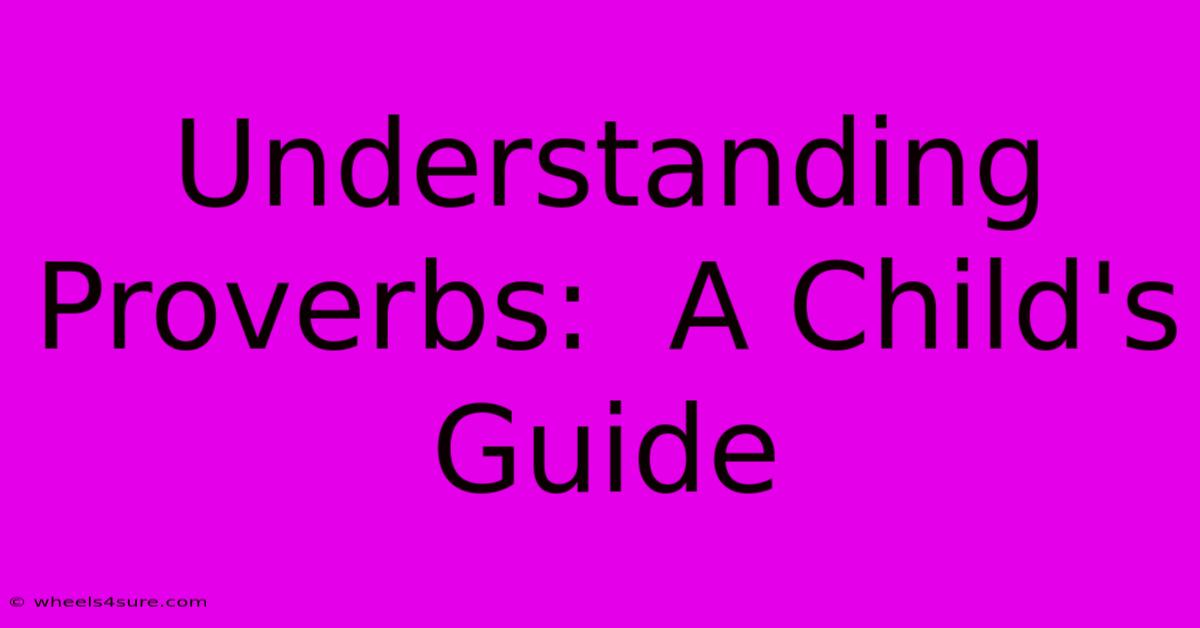Understanding Proverbs: A Child's Guide

Table of Contents
Understanding Proverbs: A Child's Guide
Proverbs are like little packages of wisdom, passed down through generations. They're short, catchy sayings that teach us important life lessons. But sometimes, they can be a little tricky to understand! This guide will help you unlock the secrets of proverbs and learn what they mean.
What is a Proverb?
A proverb is a traditional saying that expresses a common truth or piece of advice. Think of them as short stories packed with meaning. They often use metaphors and imagery to make their points memorable. For example, "A bird in the hand is worth two in the bush" doesn't literally mean you should prefer one bird to two. It teaches us that it's better to be content with what you have than to risk losing it all for something more.
Why are Proverbs Important?
Proverbs are important because they:
- Teach life lessons: They offer guidance on how to navigate different situations.
- Preserve cultural heritage: They reflect the values and beliefs of a particular culture.
- Make learning fun: They're often memorable and easy to understand, even for kids.
- Improve communication skills: Using proverbs in conversation can make you sound wise and insightful.
Decoding Proverbs: A Step-by-Step Guide
Understanding a proverb often takes more than just reading the words. Here's how to break it down:
1. Read the Proverb Carefully: Pay attention to every word. What is it saying literally?
2. Think About the Meaning: What is the overall message or lesson? Does it tell you something about how to behave? What would happen if you didn't follow the advice?
3. Look for Figurative Language: Proverbs often use metaphors (comparing unlike things) and similes (using "like" or "as"). Try to figure out what these comparisons mean.
4. Consider the Context: Where did you hear this proverb? Knowing the cultural background can shed light on its meaning.
5. Ask for Help: If you're still unsure, ask a grown-up for help! They may have heard the proverb before and can explain it.
Example Proverbs and Their Meanings
Let's explore a few common proverbs and decipher their hidden meanings:
"Don't count your chickens before they hatch." This means don't assume something will happen until it actually does. It's important to be realistic and not get ahead of yourself.
"A penny saved is a penny earned." This teaches us the importance of saving money. Saving is just as valuable as earning.
"Actions speak louder than words." This means that what you do is more important than what you say. Your actions show your true character.
"Look before you leap." This advises us to think carefully before making a decision, especially a risky one.
Activities to Help You Learn Proverbs
- Create a Proverb Dictionary: Write down your favorite proverbs and their meanings. Draw pictures to illustrate them.
- Play Proverb Charades or Pictionary: Act out or draw a proverb for others to guess.
- Listen for Proverbs in Stories and Books: Pay attention to how proverbs are used in the stories you read.
- Share Proverbs with Friends and Family: Teach your friends and family what you've learned!
Conclusion: Unlocking the Power of Proverbs
Proverbs are a valuable part of our language and culture. By learning to understand them, you gain access to a wealth of wisdom and guidance. So, the next time you hear a proverb, take a moment to ponder its meaning – you might be surprised at what you discover! Remember, understanding proverbs is a journey, not a race. Keep exploring, keep learning, and keep sharing the wisdom!

Thank you for visiting our website wich cover about Understanding Proverbs: A Child's Guide. We hope the information provided has been useful to you. Feel free to contact us if you have any questions or need further assistance. See you next time and dont miss to bookmark.
Featured Posts
-
Unwavering Strength The Honor Within
Apr 06, 2025
-
Sugar The Silent Killer
Apr 06, 2025
-
Perry Chois Net Worth The Numbers Explained
Apr 06, 2025
-
The Real Kim Soo Hyun Age Finally Revealed
Apr 06, 2025
-
How Much Is Kim Soo Hyun Really Worth
Apr 06, 2025
